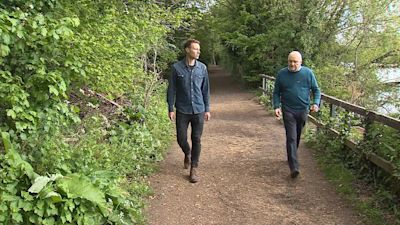Using nature to nurture well-being: how being in green spaces can ease lockdown anxiety

Watch this report by ITV Anglia's Claire McGlasson
The Government's mental health recovery plan intends to invest 500 million pounds in support services over the next 12 months.
This is part of its post-pandemic build back better initiative.
It comes as a study into mental health during the pandemic found more instances of anxiety, sleep loss as well motivation issues with young people.
This year's theme for Mental Health Awareness Week is to do with nature.
It is thought that Green spaces and nature could be used to help nurture our mental well-being.
Hannah Vitacolonna says she and her daughter struggled with the isolation of spending so much time in lockdown - at home in Ely during the pandemic.
However, they found that walking in places like the Wildfowl and Wetlands Trust's reserve at Welney in Norfolk was a great way to escape from the pressure of being stuck at home.
The Trust has teamed up with the Mental Health Foundation to promote the benefits of spending time in the countryside.
This was found in last year's People & Nature Survey for England.
The reserve at Welney is open seven days a week but visitors do have to book in advance.
Like many charities the Wildfowl and Wetlands Trust has been impacted by Covid.
At Welney, the site had to be completely closed between January and April but now are able to welcome visitors again.
As the restrictions continue to ease, the hides here will reopen on Monday.
Birdwatchers will soon be able to sit in comfort to get away from the stresses and strains of home life and spend some time watching wildlife.
Watch the full interview with Sir Norman Lamb
Former Health Minister, Sir Norman Lamb is the Chair of the advisory board of Kooth, the digital mental health platform.
The platform has recently carried out detailed research into the state of people's mental health through the pandemic.
Here's what he had to say on...
The findings of the research
I think it shows, what probably we all know, the pandemic has had an impact on the nation's mental health. The way I describe it is there is a psychological fallout from this Pandemic. Many people have experienced anxiety and some have experienced depression. There's been a worrying rise in eating disorders, particularly amongst young people, and some people have experienced suicidal thoughts. I think the important lesson to learn from this is that we have to respond to people's needs. Providing digital support to people I think is a really important part of the support arrangements that we should have in place. Kooth works really closely with local NHS organisations. Just as we've seen over the pandemic an incredible increase of us shopping online and having Team and Zoom meetings online - we've also seen a massive increase in the number of people getting support for their psychological needs online and I think that's a very positive thing.
If support can be effectively provided digitally
There will always be people who need access to formal mental health treatment in the clinic. People can get one-to-one counselling and they can get onto it anonymously. So if you think about a young teenager who might be worried about what's going on in their head, they can quietly explore what might be the problem. They can talk to someone and have one-to-one counselling and they don't have to wait a year, or whatever it might be in the local NHS, to access that support - they can get it almost straight away. The majority of the users actually go onto the system outside normal working hours so in evenings and in weekends. I think that's another attraction, particularly for young people.